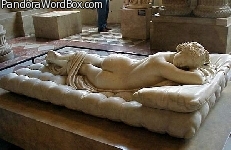Our websites offer information mostly for educational purposes with no intent to alter health care protocols nor to serve as a sole source of medical information.
Always seek the advice of your local health care provider.
|
×  Get the Point! PAIN – WOMAN – UKRAINE – PUTIN MOTHER – SISTER – SPOUSE – MOTHER RUSSIAN WAR – HOLOCAUST – GENOCIDE |
HERMAPHRODITE
Gender Chimera or Sexual Ambiguity
Hermaphroditus
Hermes and Aphrodite
In medical parlance, "INTERSEX" or "AMBIGUOUS SEXUAL PHENOTYPE" point to a large complex of conditions due to a variety of causes (etiology) and mechanisms (pathogenesis). One of the IMPORTANT considerations is that when a newborn has ambigous genitals, the circumstance IS A SOCIAL EMERGENCY calling for immediate professional expert advice to help parents to adopt consistent long term strategies compatible with the medical and social needs of the newborn.
The above statue is one of many Roman copies and reflects tolerance and interest in phenomena of altered sexual differentiation. The clone shown here was "acquired" by Napoleon from the Borghese Collection for the "Napoleon Museum" that became "The Louvre Museum". In the opinion of this viewer, socially speaking, this individual seems to be cast as a female. Today such individuals are more likely to be cast as "imperfect" males.
"Herm-aphordite" is perhaps an acerbic reminder left us by ancient poets who, like Lucretius, viewed life as a continuum. The story that the affair of Hermes with Aphrodite produced a "herm-aphrodite" is consonant with his characater. As the messenger of Zeus and an compulsive thief, Hermes relied on his skills as diplomat using duplicitous diplomatic language to achieve his goals. Such skills are admiredby mercenary merchants who chose Mercury as their champion and protector.
From the point of view of a mortal child of ambigous gender, the fate in a modern world seems harsher that in the world of poets like Lucretious. Now Biblical ideas about sexuality continue to permeate many "modern" inmoderate societies obsessed with ideas of sin. Parents of boys with "fem"inine hips, bottocks, "fem"ur or thighs, a rather pre-puberal phalus (falus) or penis (pene, penetrate) and "gyneco"mastia (feminine mastos or breasts) such as shown here and companion imgages should know abouat Klinefelter syndrome (KS). Early recongition and therapy will help secure social acceptance for such a boy. It is not surprising that KS did not escape the attention of ancient sculptors. KS is rather common, it occurs in about 1 in 500 to 1 in 1000 males born. Sings of delayed or incomplete puberty, persisting gynecomastia, small penis and testicles and later infertility should prompt medical evaluations including for KS syndrome. Further comments are given in notes of companion images.
Two other of many ancient representations of males with gynecomastia (feminized breasts), on the left, probably an instance of Klinefelter syndrome (infatile male genitals); on the right, a well masculinized youth, probably with islolated gynecomastia (unlikely to represent Klinefelter syndrome).
W. Wertelecki, M.D.











